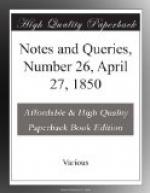“We watch for the light of the moon
to break
and colour the grey eastern sky
With its blended hues of saffron and lake,”
&c.
I have always understood them to be Dr. Aikin’s, but latterly that has been contradicted.
Buriensis.
William Godwin.—Can any of your correspondents tell me where I can find an account of the leading events of the life of William Godwin, author of Caleb Williams, St. Leon, Mandeville &c., or any reference to his last hours? His sentiments, political and religious, are said to have been peculiar.
N.
Woodbridge, April 15.
Regimental Badges.—When were the regimental badges granted to the first nine infantry corps of the line, and under what circumstances were they so granted?
J.C.
London, April 15. 1850.
Mother of Thomas a Becket.—The well-known romantic legend of the origin of this lady has been introduced into the Pictorial History of England, on the authority of “Brompton in X. Scriptores.” And on the same page (552. vol. i.) is a pictorial representation of the “Baptism of the Mother of Becket, from the Royal MS. 2 B. vii.”
Now, Lord Campbell, in his Lives of the Chancellors, repudiates the story in toto; but without assigning any other reason for doing so, than an inference from the silence of Becket himself and his secretary, Fitzstephen, on the point.
Can any of the learned gentlemen, whose distinguished names adorn your valuable pages, direct an humble student to the fountain of truth, for the settlement of this verata questio?
W. Franks Mathews.
Kidderminster, April 7. 1850.
Swords worn in public.—Can any of your correspondents say when swords ceased to be worn as an article of ordinary dress, and whether the practice was abolished by act of parliament, or that they gradually went out of fashion.
J.D.A.
April 17. 1850.
Emblem and National Motto of Ireland.—How long has the harp been the emblem, and Erin-go-bragh the national motto of Ireland? To this I give another query,—What is the national motto of England?
E.M.B.
Latin Distich and Translation.—Who were the authors of the following Latin Distich, and its English translation?
“Mittitur in disco mihi piscis ab
archiepisco—
—Po non ponatur, quia potus
non mihi datur.”
“I had sent me a fish in a great
dish by the archbish—
—Hop is not here, for he gave
me no beer.”
E.M.B.
Verbum Graecum.—Who was the author of
“Like the verbum Graecum
Spermagoraiolekitholukanopolides,
Words that should only be said upon holidays,
When one has nothing else to do.”
The verbum Graecum itself is in Aristophanes’ Lysistrata, 457.
E.M.B.




